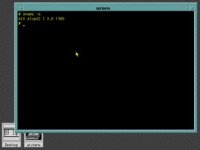Caluser2000
Banned
Whilst reading through my OS/2 manual about about OS/2s boot loader I came across AIX which could be installed on 386 class machines. From what i can gather it was a joint project between Lotus and IBM called PS/2 AIX around 1987.
Did anyone on these forums use it at all in a production enviroment? Seems quite interesting http://www.ibmmuseum.com/ohlandl/AIX_1-3/AIX_For_PS2.html
I'm also curious as to the specs of the computers you actually ran the OS on, particuarly non IBM branded stuff.
Full installation is something 90 1.44meg floppies and scsi hdd I gather- http://ps-2.kev009.com:8081/moreaixps2/aix-supp-hw.html
List of recommended, read IBM, machines- http://ps-2.kev009.com:8081/moreaixps2/aix-supp-hw.html
Did anyone on these forums use it at all in a production enviroment? Seems quite interesting http://www.ibmmuseum.com/ohlandl/AIX_1-3/AIX_For_PS2.html
I'm also curious as to the specs of the computers you actually ran the OS on, particuarly non IBM branded stuff.
Full installation is something 90 1.44meg floppies and scsi hdd I gather- http://ps-2.kev009.com:8081/moreaixps2/aix-supp-hw.html
List of recommended, read IBM, machines- http://ps-2.kev009.com:8081/moreaixps2/aix-supp-hw.html
Last edited:



